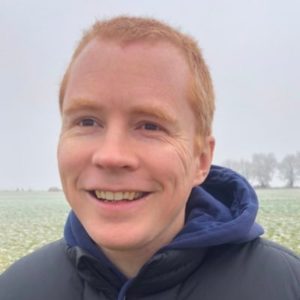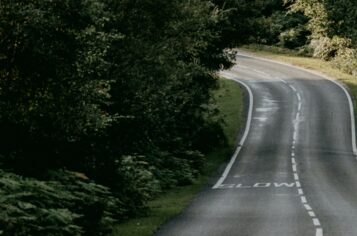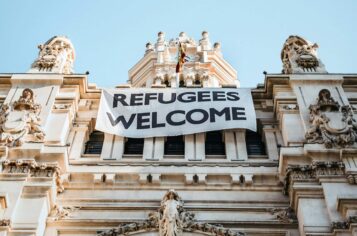
How did we become so divided and what do we do about it?
This is the big question asked by Jon Yates in his new book Fractured. It’s a question we might find ourselves asking when we experience yet another political conversation with a family member going south. When we turn on the news and hear of escalating tensions between global leaders. Or perhaps when we notice that we gravitate towards friends who think and live alike.
Division often feels complex and ever-present, whether personal, national or global. But when we take a closer look at why we become divided, as well as what can bring us back together, we start to notice some common dynamics at work.
We caught up with Jon to find out more, and to learn what impact our faith can have in our divided world.
.
What motivated you to write ‘Fractured’?
“A few years ago I realised that my life has involved me living in a series of ‘bubbles’. Whether it’s where I grew up, went to university or places I worked, there had always been a lot of similarity with the people I was surrounded by. At times I felt like I had moved out of these bubbles as people initially seemed quite different, but over time I would recognise that everyone around me was very similar in other ways, such as how much money we earnt. This came to concern me.
Additionally, my dad was a vicar and the church was a place where people who were different could connect, but it was also a place where you would occasionally see the ‘tyranny of small differences’. Groups in the church with theological differences would speak about each other as if they were highly organised and up to something, when in my experience all of those lovely people were not either of those things! This tendency to see the other as nefarious struck me as weird and worrying.”
How can we go beyond proximity and into relationship with those we have perceived as ‘other’?
“We have this tendency to feel judged quite easily and to feel quite anxious around difference. What changes that is when we actively do something together. There are three things we can do:
- Being with someone different from you.
- Engaging with equal status.
- Doing something outside of both your comfort zones, or something that involves some sort of routine activity.
These steps can help us connect, even across major differences and disagreements.”
How can the church create a space where divides are crossed, with people from different walks of life coming together and doing things together?
“The word religion comes from the Latin religare, ‘to bind’, and for centuries organised religion has been what connected people together in their communities. For 2000 years the church has been gathering people from different walks of life, and it can be a really good space for this to happen because at its best it involves authenticity, equality of status and shared experiences. However, everything that is good can go wrong. Divisions in church can emerge around education levels, who is included or excluded from leadership, and also a failure to address racial division. Martin Luther King Jr. once referred to Sunday at 11am, when congregations of churches gathered, as “the most segregated hour in America”.
So what must we do? Firstly I think we should recognise the great gift we’ve got in having a space that does appeal to a diverse group of people and can bring them together. Secondly, anyone in a church needs to ask “How can we ensure we’re not just appealing to one type of people? Who is up at the front? What language do we use?” Finally, we should consider how we can create those shared memorable moments that build connection between people. This means more than just a Sunday service – it might look like doing something within the community, or anything that gets everyone outside of their comfort zone to create a sense of commonality.”
In what ways did your faith shape the thinking of the book?
“God is clearly mysterious and hard for us to understand, but we know that the Christian God is relational – we see this through the Trinity. So at the heart of the God that I try to worship with my life is a set of relationships. The Sermon on the Mount is so focused on the things that can get in the way of relationships working well. And throughout the rest of the Bible we see such a focus on how people relate to one another, to God, to themselves.
I’ve seen the primary purpose of a human being to live at peace with God and with others, which is essentially a set of relationships. Division is a lack of this peace, either in destructive conflict or a tendency to see ugliness in ourselves or others. All of these things put relationship front and centre for me.”
In ‘Fractured’ you talk a lot about an instinctive bias we all have towards ‘People Like Me’, and how it’s actually something that we can learn to reshape. In the Difference course we teach three reconciling habits: Be Curious, Be Present and Reimagine. How do you see these habits helping us to reshape this bias?
“The idea of being present is about being authentic and being open. The truth is we’re all insecure in some way and we’re all anxious about something. When we’re authentic about that, people start to relax a bit and they start to feel ‘I don’t need to prove I’m better’ or ‘I don’t need to exit before you get to know me’. Instead they just feel welcome as they are. That means the equality of status starts to have a chance of coming in, which means those bonds can form.
Then as we reimagine we can start to rebuild. It is the ‘doing stuff’ together that is so immense – helping people to see how things could be different and then making it happen. I’m reading Nehemiah at the moment and it strikes me that it’s in the building of the city walls that people can start to find that sense of intense activity and routine.”
Archbishop Justin Welby talks a lot about the power of ‘Disagreeing Well’. What role do you see this playing?
“Before deciding what’s right it’s important to hear a diverse set of opinions and to really understand the opinion you disagree with. Disagreement is really important because no one knows by themselves what the right answer is. The Bible teaches us that we’re meant to work as part of a wider team, like in 1 Corinthians 12, where it says “The eye cannot say to the hand, “I don’t need you!” Conflict can enable us to make good decisions, but only when we’re prepared to disagree well and make space for different views. I think recently society has become scared of good conflict, and hasn’t known how to do conflict well when it happens.”
What are your hopes for people who read ‘Fractured’?
“Firstly, I think that the level of division we have in our societies isn’t taken seriously by government. Because we tend to see it as a problem the government couldn’t fix, we tolerate it and assume it’s just the way it is. I want to say with this book that it doesn’t have to be like this! And if we want to change it, we can.
I also wanted to share some of the things that we could do, both big things through our government and little things we can all do. I want to give church leaders and others the chance to ask “Am I creating a common life in my church? Am I working with people from different backgrounds? Am I giving them a shared experience?” Because those are the questions that enable us to cross divides.”
Finally, what are some next steps for people?
- Take a look at who you’re following on social media.
If you agree with everything people have said in the most recent 10 posts, connect with some new people who you disagree with. - Join something.
It doesn’t really matter what it is (ideally something you don’t have to pay to be a member of), but join something where you’ll meet people you don’t know. Try going 4 times – if you hate it, stop! - Practise hospitality.
Once a year invite some neighbours round, but don’t just pick the ones you like. Instead choose people by proximity to you, or roll a dice if you want something more chaotic!

Jon Yates leads an organisation called the Youth Endowment Fund, which exists to reduce violence. He lives just south of London with his family where he is outnumbered by small children and small animals.



